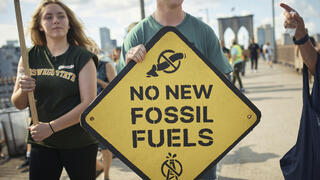
Despite the climate agreement signed at 2023’s COP28 UN Climate Change Conference in Dubai, which pledged to downscale fossil fuel industries , it now seems that the world's major economies are working to expand their oil, coal and gas industries over the coming decades. Although the use of renewable energy from solar and wind power has increased, it is still a long haul to eliminate fossil fuels globally, according to data from the International Energy Agency (IEA). Global warming trend from 1880 to 2020 ( Video: NASA ) Meanwhile, the European Union’s Copernicus Climate Change Service has estimated that 2024 is likely to be declared the hottest year on record due to continued greenhouse gas emissions.
Global emissions—mainly from the fossil fuel industry—are at an all-time high, pushing greenhouse gas concentrations that warm the planet to unprecedented levels. “Leaders have been grappling with how to turn those commitments into reality,” Katrine Petersen of E3G, a global climate think tank focused on emission reduction, told AFP. “There has been a bit of a vacuum of political leadership on some of this.

.. and a potentially worrying trend that this landmark energy package has been slipping off leaders' political agendas.
" The countries most threatened by extreme climate scenarios are small island nations, highlighting climate injustice. The least polluting nations are the ones bearing the brunt of climate change's devastating consequences. “The commitments in the agreement haven’t materialized,” Dr.
Pa'olelei Luteru, chair of the Alliance of Small Island States (AOSIS ) told AFP. 3 View gallery Protest against use of fossil fuels ( Photo: Andres Kudacki, AP ) Papua New Guinea, a poor Pacific nation in a region highly vulnerable to climate change, has chosen to boycott the upcoming talks in Azerbaijan partly due to the lack of financial support for member states. Yalchin Rafiyev, Azerbaijan’s Deputy Foreign Minister and lead mediator at the conference scheduled for November 11–22, acknowledged that many nations are seeking concrete steps at the climate summit to demonstrate the Dubai agreement's effectiveness.
Behind the scenes, however, oil-rich countries feel pressured by the agreement, which they say restricts their ability to continue developing their fossil fuel industries, including the host nation, Azerbaijan, which aims to protect its oil and gas interests. The hosts deny these allegations, asserting they will work to advance funding support for countries needing assistance to cope with climate change. Despite political obstacles, there are signs that the shift to green energy production is progressing.
According to the International Energy Agency, the goal is for half of the world's electricity to come from low-carbon sources by 2030. 3 View gallery Forest fires resulting from climate change ( Photo: Bruno Fonseca, AP ) Last October, G20 nations, whose economies account for three-quarters of global emissions, committed to a drastic reduction in fossil fuel use. However, recent history shows a significant gap between countries' words and actions.
For example, Madagascar has declared an uncompromising climate policy. “If we look at action and ambition, nothing much has happened at the global level since last year's report,” said United Nations Environment Program (UNEP) researcher Dr. Anne Olhoff.
The UNEP leads global environmental policy, coordinates UN agencies during environmental events and advances environmental metrics in the UN's sustainable development goals. Pressure is mounting on countries to take concrete steps to reduce their reliance on fossil fuel industries as much as possible. 3 View gallery COP29 ( Photo: REUTERS/Aziz Karimov ) A shift is clearly needed to address the gap between promises to meet targets and temperature limits set in the 2015 Paris Agreement and the continued approval of new oil and gas fields, as seen in the United Arab Emirates, Azerbaijan and Brazil —nations that have hosted or will host the climate conference in 2023, 2024, and 2025 respectively.
Meanwhile, global temperatures continue to rise, leading to devastating effects on both humans and the ecosystem. Get the Ynetnews app on your smartphone: Google Play : https://bit.ly/4eJ37pE Apple App Store : https://bit.
ly/3ZL7iNv >.














